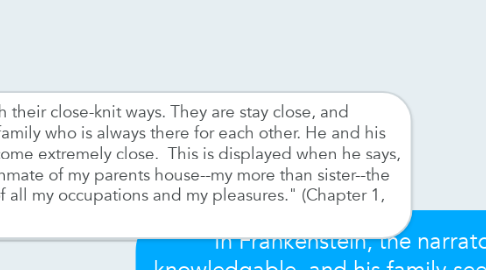In Frankenstein, the narrator is knowledgable, and his family seems idyllic and stable.
by Hayley Murray

1. The family displays stability through their close-knit ways. They are stay close, and Frankenstein paints a picture of a family who is always there for each other. He and his adopted sister, Elizabeth, even become extremely close. This is displayed when he says, "...Elizabeth Lavenza became the inmate of my parents house--my more than sister--the beautiful and adored companion of all my occupations and my pleasures." (Chapter 1, Frankenstein)
2. Closing Statement: All in all, Victor Frankenstein expresses in his narration to Walton, that he had a perfect childhood. He was close with his family, and was a smart young man. These "perfect" traits may not remain perfect though, and there could be disaster when the perfection implodes.
3. Frankenstein has vast thirst for knowledge, and explains to Walton how he spent much of his childhood trying to quench that thirst. He is enraptured with the many mysteries of the natural world. "Natural philosphy is the genuis that has regulated my fate." (Chapter 2, Frankenstein) He explains this newfound interest in the natural world, after he learns about it from an alchemist as a child.
4. His family displays an idyllic characteristic in the beginning the novel. They are loving and caring, and take in Elizabeth as their own. They have, what Victor claims, a perfect family. "No human being could have passed a happier childhood than myself." (Chapter 2, Frankenstein)


